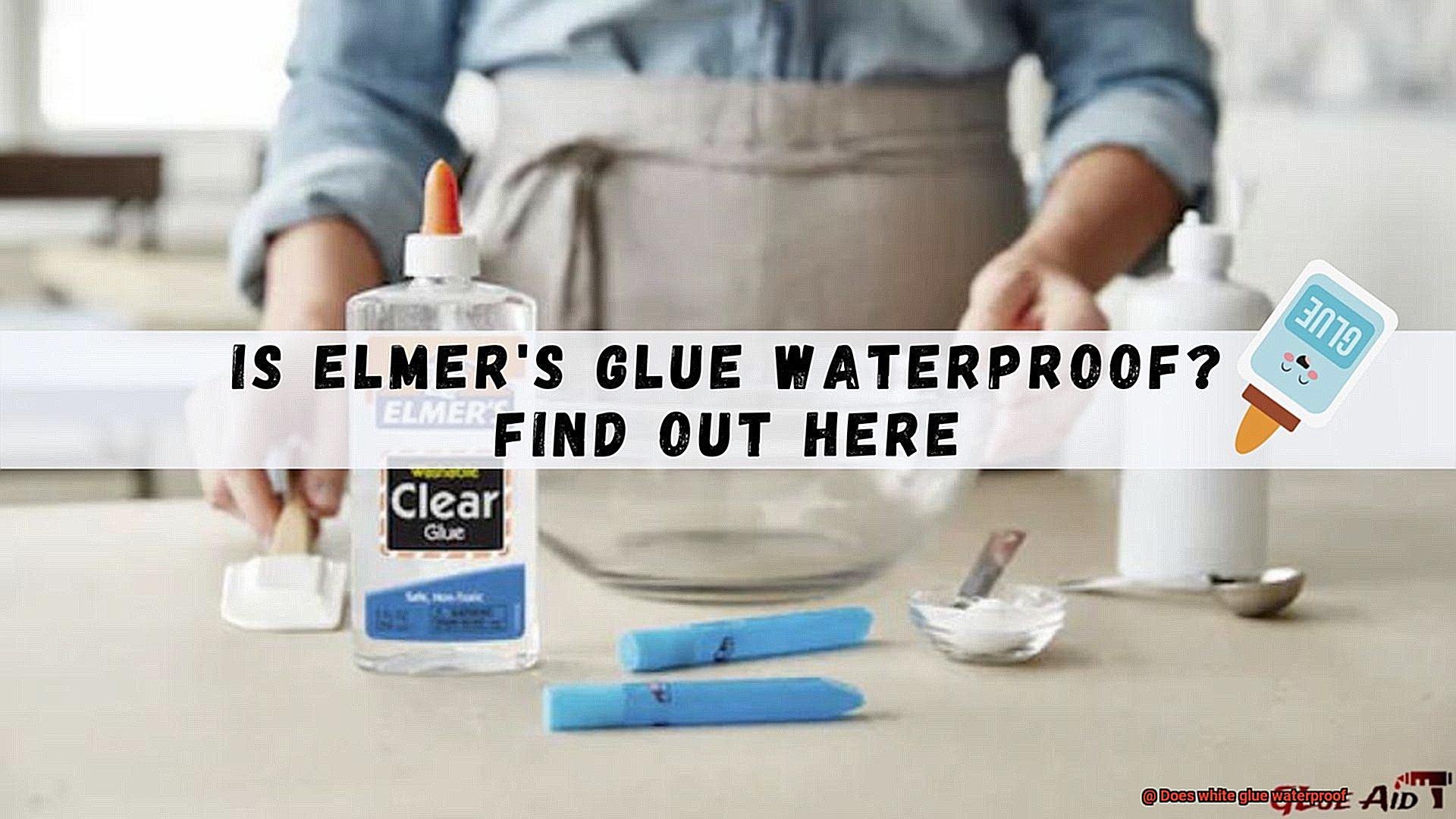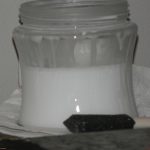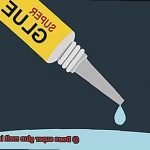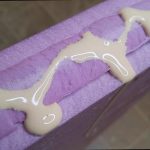As a DIY enthusiast, you understand the importance of having an adhesive that can stand up to different conditions. But when it comes to white glue, its versatility and wide range of applications may leave you wondering about its waterproofing capabilities. Can it hold strong against water and moisture?
It’s a question many people ask themselves, and the answer isn’t as simple as you might think. While white glue can resist water to some extent, it’s not entirely waterproof. That means if you use it in areas with excessive moisture, it may lose its grip and fail to bond correctly.
The good news is that there are ways to enhance the waterproofing capabilities of white glue. You can add waterproofing agents or use a sealant to make sure your project stays put even in wet conditions. Knowing what type of glue to use and how to apply it is crucial for achieving a strong and long-lasting bond.
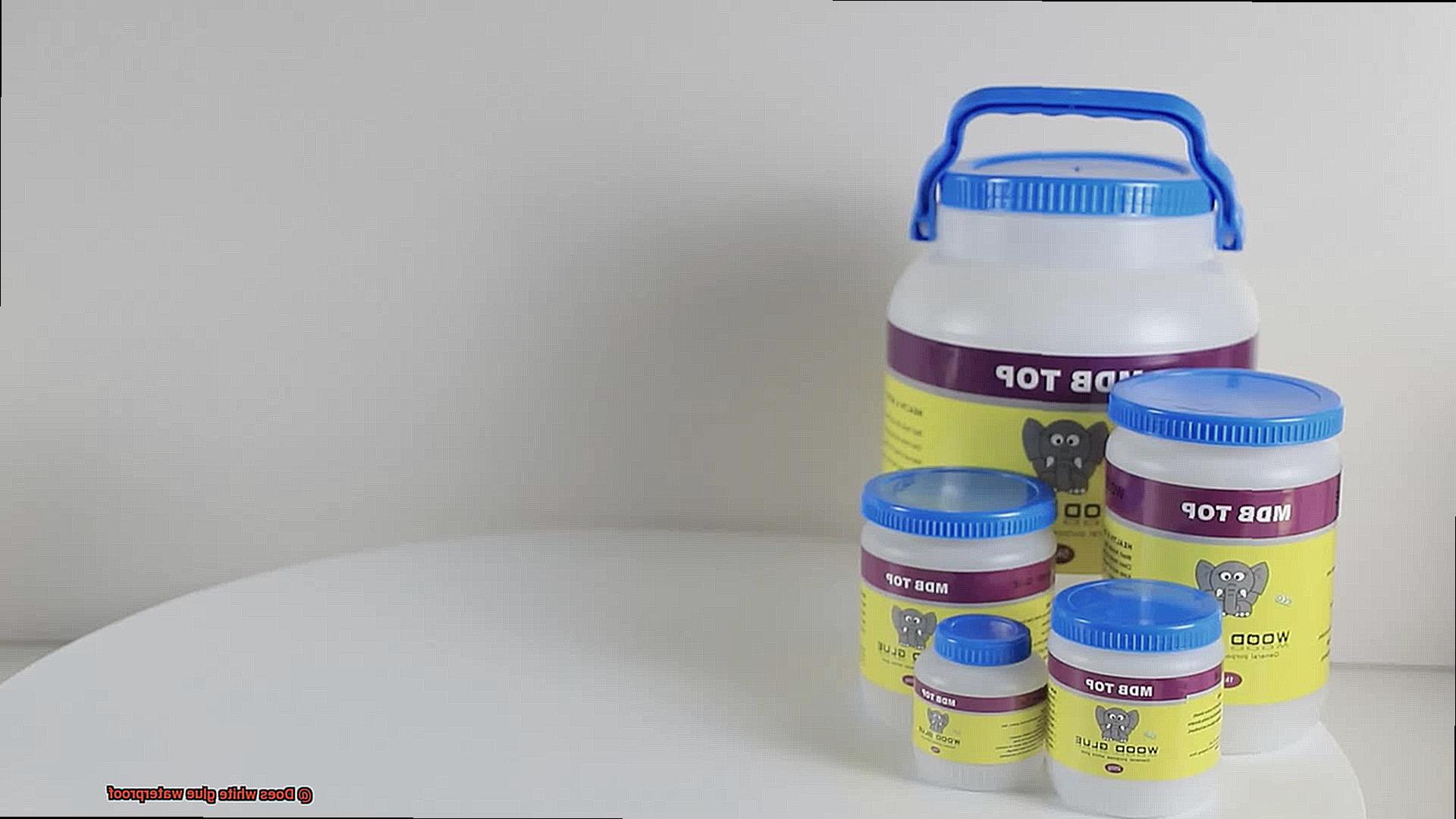
In this blog post, we’ll delve into whether white glue is waterproof, what factors affect its performance, and how you can make it more resistant to water.
So, if you’re planning a DIY project that involves water or moisture, read on for everything you need to know about using white glue for optimal results.
What is white glue?
Contents
If you’re looking for a reliable, easy-to-use adhesive that can handle a variety of projects, white glue is a fantastic option.
Also known as school glue or PVA glue, white glue is a type of water-based adhesive that’s made from polyvinyl acetate, a water-soluble polymer derived from ethylene and acetate.
It’s non-toxic and safe for children to use, making it a popular choice for arts and crafts projects in schools or at home.
White glue has a thick consistency that makes it ideal for gluing porous materials such as paper, cardboard, fabric, and wood. It dries clear, so you won’t have to worry about unsightly residue or discoloration on your projects. Plus, it dries relatively quickly depending on the thickness of the layer applied, so you can move on to the next step of your project without much delay.
One thing many people wonder about white glue is whether or not it’s waterproof.
The answer to this question depends on the type of white glue being used. Some types of white glue are water-resistant, which means they can withstand some exposure to water without losing their adhesive properties.
However, it’s important to note that these types of glue aren’t completely waterproof and shouldn’t be used for applications where they’ll be in constant contact with water.
If you need an adhesive that can stand up to exposure to moisture, there are options available. Some types of white glue are specifically designed to be waterproof or weatherproof. These types of glue are labeled as such and are typically made with a different type of resin than regular white glue, which gives them superior water-resistant properties.
That being said, even waterproof white glue may not be completely impervious to water. Prolonged exposure or immersion in water can cause the glue to break down over time.
Additionally, factors such as temperature and humidity can also affect the performance of white glue.
Different Types of White Glue
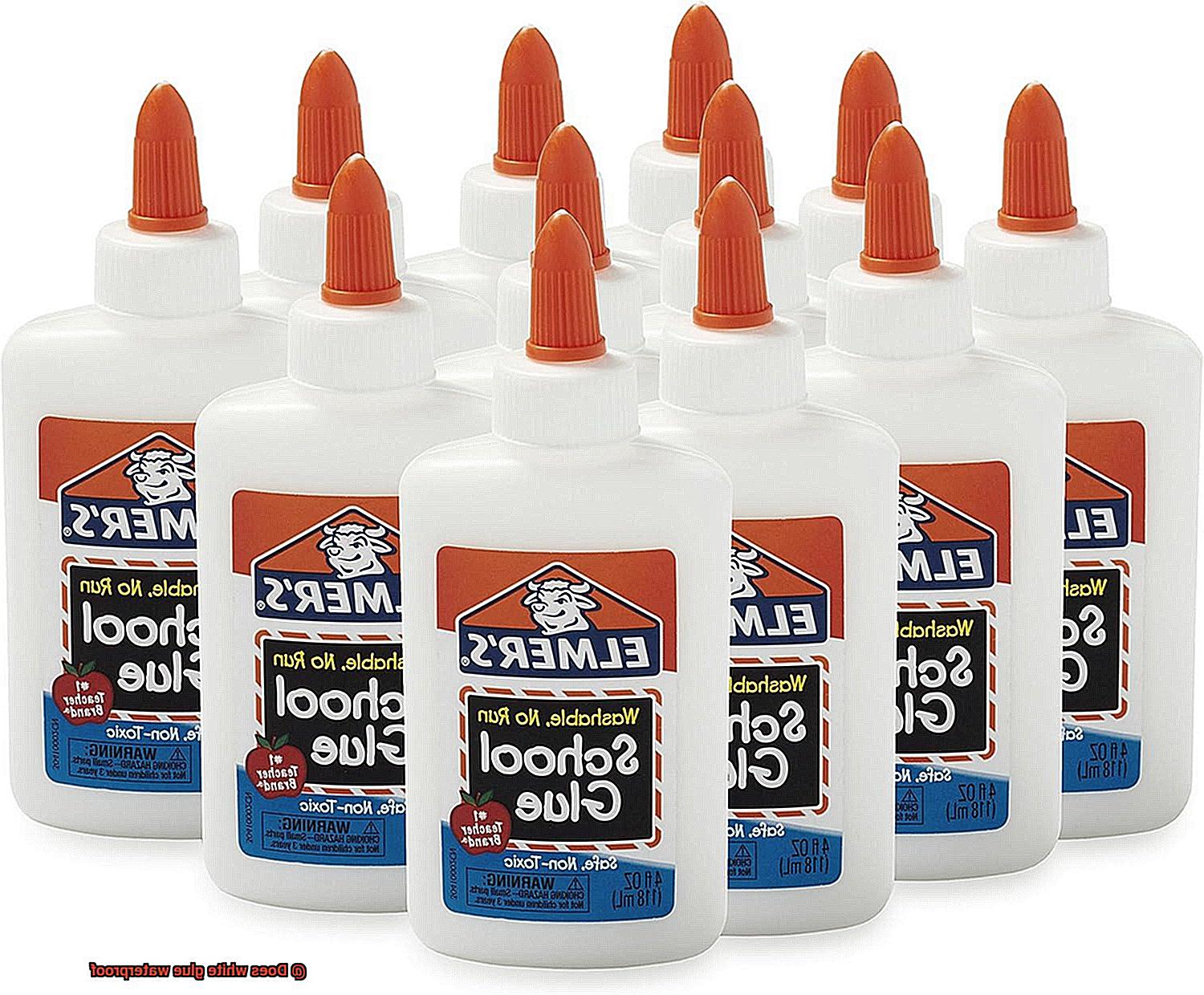
This versatile adhesive is known for its ability to bond a variety of surfaces, and there are several different types of white glue available on the market to suit your specific needs.
First up is PVA glue, the most common type of white glue. This water-based adhesive dries clear and is perfect for bonding porous materials like wood, paper, and fabric. It’s easy to clean up with water, making it an ideal choice for those who want a fuss-free solution.
If you need a more durable and water-resistant option, consider PVAC glue. This variation of PVA glue contains additional polymers that make it more suitable for bonding non-porous materials like plastic, metal, and ceramic.
For crafting and DIY projects, white craft glue is a thicker version of PVA glue that’s easy to work with. It dries clear and can be painted over once it has dried. This type of white glue works best on paper, cardboard, and other lightweight materials.
School glue is a low-cost adhesive commonly used in classrooms and art projects. It dries clear and washes off easily with soap and water. School glue is perfect for paper, cardboard, and other porous materials.
If you’re a woodworker, carpenter’s glue is the type of white glue for you. This modified PVA glue provides a stronger bond for woodworking projects. It dries clear and can be sanded or painted over once it has dried. Carpenter’s glue works best on wood, particleboard, and plywood.
Regular White Glue
It’s a go-to adhesive for many crafting and woodworking projects, thanks to its strong bond and clear finish. But what about its waterproof properties? Can you rely on regular white glue for projects that may be exposed to water or moisture? Unfortunately, the answer is no.
Regular white glue is made from polyvinyl acetate (PVA), a water-soluble polymer that dries clear and creates a strong bond between surfaces. However, when exposed to water or moisture, the bond weakens or breaks down completely.
This means that any project you create with regular white glue will not be able to withstand exposure to water or moisture.
There are plenty of other adhesives that are specifically designed for waterproofing applications. Epoxy and silicone sealant are two great options that provide a strong and durable bond that resists water and moisture.
These adhesives are perfect for projects like sealing leaky pipes, repairing gutters, or even making waterproof crafts like boats or outdoor furniture.
Water-Resistant White Glue
When it comes to crafting or DIY projects, water-resistant white glue is a game-changer. This type of adhesive is specially designed to repel water and withstand exposure to moisture, making it a go-to for outdoor projects and items that may come into contact with water.
One of the key benefits of water-resistant white glue is its ability to provide a strong and durable bond, even in wet conditions. Whether you’re working on a boat, furniture, or children’s toys, you can trust that this adhesive will keep your project intact and secure.
While water-resistant white glue is an excellent choice for water-resistant applications, it’s important to note that it’s not completely waterproof. Over time, extended exposure to water may cause the adhesive to weaken and break down.
To ensure maximum protection against water damage, consider pairing water-resistant white glue with additional waterproofing measures like sealants or coatings. This will add an extra layer of protection and help prolong the life of your project.
Waterproof White Glue
This type of glue is specially designed to resist water and provide a permanent bond that can hold up against the toughest conditions.
Whether you’re building a boat, crafting outdoor furniture, or working on a woodworking project, waterproof white glue is the perfect choice. Its ability to provide a secure and long-lasting bond in wet environments makes it a superhero adhesive that you can rely on.
One of the key benefits of waterproof white glue is its clear drying feature. This means that it won’t detract from the visual appeal of your finished project. Plus, its special additives make it resistant to water and moisture, ensuring that your project stays strong and secure for years to come.
It’s important to note that not all white glue is created equal. Some types are not waterproof and may break down over time when exposed to water or other liquids. Therefore, it’s essential to read the label carefully before using any type of glue to ensure it’s suitable for your specific application.
Does White Glue Make It Completely Waterproof?
While white glue, also known as PVA glue, is a popular choice for many crafting and school projects, it’s important to understand that it is not completely waterproof.
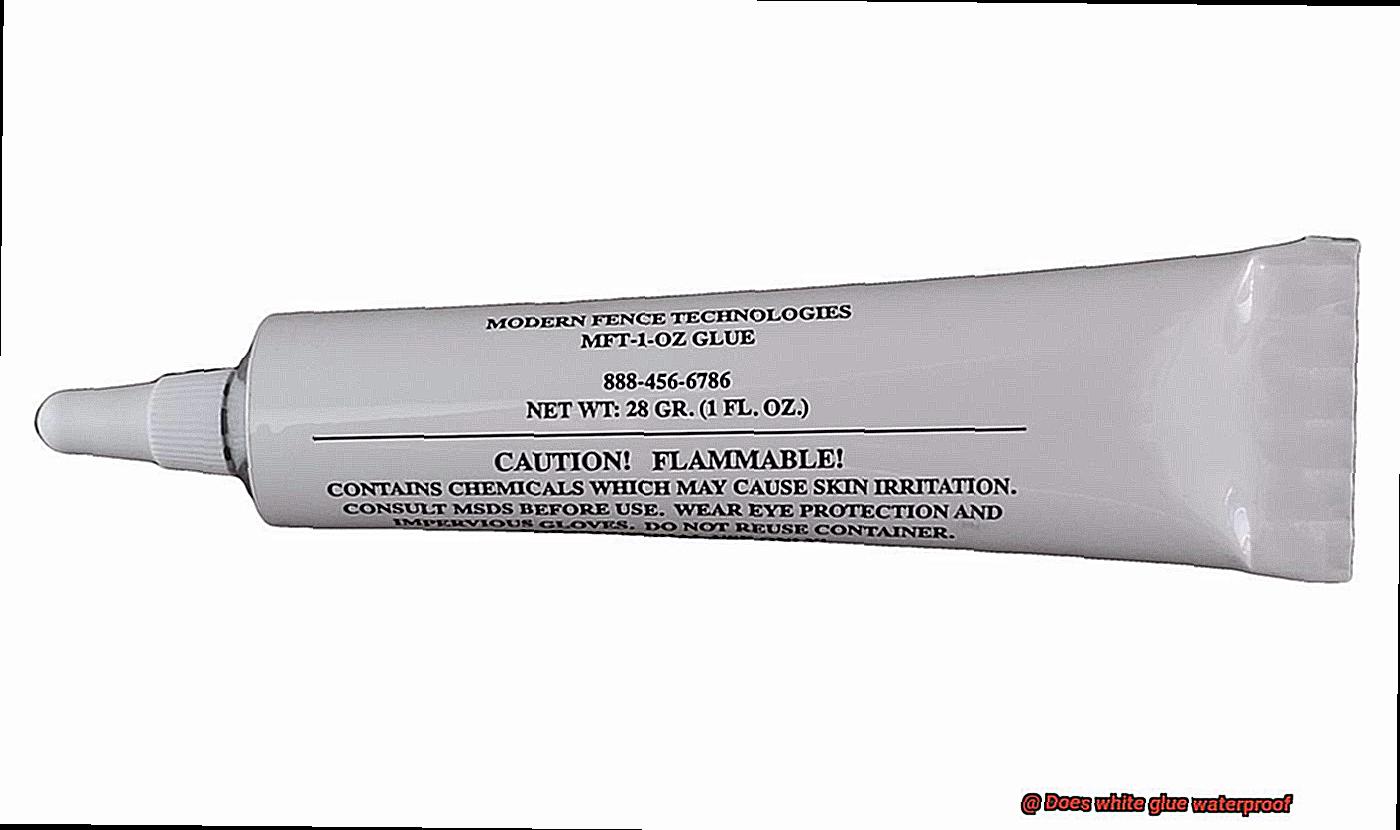
White glue is a water-based adhesive, which makes it easy to dilute with water for a more fluid consistency. However, this same property can make it vulnerable to exposure to water. The long chains of molecules that make up PVA glue are held together by hydrogen bonds. When these bonds come into contact with water, they break down and cause the glue to lose its adhesive properties.
While white glue is somewhat water-resistant, it cannot withstand prolonged exposure to water or complete immersion in water. Therefore, if you need an adhesive that provides long-term protection against exposure to water, white glue may not be the best option.
You can boost the water-resistance of white glue in a number of ways. One method is to mix it with other substances that enhance its waterproofing capabilities, such as silicone sealant or acrylic paint. Another method is to apply a sealant on top of the dried glue using products like varnish or clear polyurethane spray.
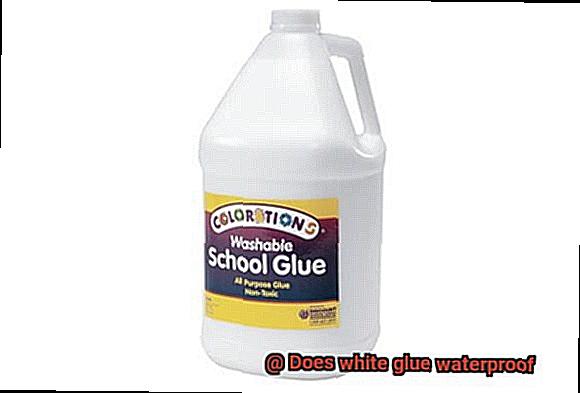
However, even with these methods, white glue will still not become entirely waterproof. It may be able to withstand short periods of exposure to water or moisture but should not be relied upon for complete waterproofing.
Factors That Affect the Performance of White Glue
It’s vital to understand the factors that can affect the performance of white glue. Let’s dive into these factors and discover how to optimize your white glue usage.
Temperature is a key factor in ensuring that white glue works effectively. It’s best to use white glue at room temperature, between 18°C to 25°C. If the temperature is too hot or too cold, the glue may not bond correctly. Hence, it’s crucial to store your white glue in a cool and dry place.
Humidity is another significant factor that can impact the performance of white glue. High humidity can cause the glue to take longer to dry, or in some cases, not dry at all. Therefore, it’s essential to apply white glue in a dry environment and store it in a cool and dry place.
Surface preparation is crucial in ensuring that white glue bonds correctly. The surface where you apply the glue should be clean and dry. Any dirt, grease, or moisture on the surface can prevent the glue from adhering properly. Hence, make sure to clean and dry the surface before applying the white glue.
The type of material you’re gluing together also plays an important role in determining the efficiency of white glue. White glue works best on porous materials like wood and paper compared to non-porous materials like metal and plastic. Thus, choose the right type of material before applying white glue.
Lastly, the application method is critical in ensuring that your white glue performs well. Applying a thin and even layer of glue to both surfaces is key for optimal bonding. Applying too much or too little glue can affect its strength.
Tips for Using White Glue in Moisture-Rich Environments
While white glue is a popular adhesive for many crafting and DIY projects, it can be a challenge to ensure that it remains strong and secure in damp conditions. But don’t worry, we’ve got you covered. Here are five tips for using white glue in moisture-rich environments:
Choose the Right Type of White Glue
Not all white glues are created equal, and some are better suited for moisture-rich environments than others. Look for options labeled as waterproof or water-resistant, as they are specifically designed to hold up well in damp conditions. And if you’re working near water, consider using a marine-grade white glue.
Prepare the Surface Properly
To ensure that the white glue adheres well to the surface, it’s crucial to prepare the area properly. Make sure that the surface is clean and completely dry before applying the glue. If the surface is damp or wet, the glue may not adhere correctly or may take longer to dry.
Apply the Glue Evenly
When applying white glue, it’s essential to apply it evenly to ensure a strong bond. Use a brush or applicator to apply a thin, even layer of glue. Avoid applying too much glue, as this can cause the adhesive to take longer to dry and may result in a weaker bond.
Allow Ample Drying Time
White glue takes time to dry, especially in moisture-rich environments. Allow ample drying time before using or handling the glued item. Be patient and avoid rushing the drying process by using heat or fans, as this can compromise the strength of the bond.
Reinforce the Bond if Necessary
In some cases, it may be necessary to reinforce the bond created by the white glue with additional hardware or fasteners. This is especially important in areas where there is a lot of movement or stress placed on the glued surfaces. By doing so, you can ensure that the bond remains strong and secure over time.
Remember, even with these tips, white glue may not be completely waterproof in all situations. If you’re unsure if your white glue is suitable for your project, check the label or contact the manufacturer for more information. With these tips in mind, you can use white glue in moisture-rich environments with confidence and ensure that your projects remain strong and durable over time.
Alternatives to White Glue for Waterproof Applications
When it comes to waterproofing, white glue may not always cut it. Luckily, there are several alternatives that can provide a stronger and more reliable bond for waterproofing needs.
One option is epoxy glue, a two-part adhesive that creates an incredibly strong and durable bond. It is resistant to water, heat, and chemicals, making it ideal for boat building and other marine applications where waterproofing is crucial.
Another alternative is polyurethane glue, which expands as it dries to create a tight seal that is resistant to water and moisture. This type of glue is commonly used in construction and woodworking projects for its water-resistant properties.
Silicone sealant is also a popular choice for waterproof applications. It creates a flexible and watertight seal that can withstand extreme temperatures and harsh weather conditions. This type of adhesive is commonly used for sealing windows, doors, and other outdoor fixtures.
For small waterproof applications, cyanoacrylate glue (super glue) can be very useful. It creates an incredibly strong bond that is resistant to water and can be used for fixing small leaks or cracks.
1CyBoWj6Tiw” >
Also Read: Is Elmer’s Glue Waterproof?
Conclusion
In summary, white glue is a highly versatile adhesive that can bond various porous materials, including paper, cardboard, fabric, and wood. However, its ability to withstand water is limited due to its water-soluble polymer composition. Although some types of white glue are water-resistant, they may not be entirely waterproof and could lose their grip when exposed to excessive moisture.
To improve the waterproofing capabilities of white glue, you can add waterproofing agents or use a sealant for optimal results. It’s crucial to select the right type of white glue for your specific application and ensure proper surface preparation before applying the adhesive.
Several factors like temperature, humidity, surface preparation, material type, and application method can affect the performance of white glue. Therefore it’s essential to consider these factors when using white glue in moisture-rich environments.
If you require an adhesive that offers long-term protection against exposure to water or other liquids, several alternatives are available like epoxy glue, polyurethane glue, silicone sealant or cyanoacrylate glue.

